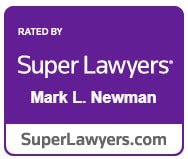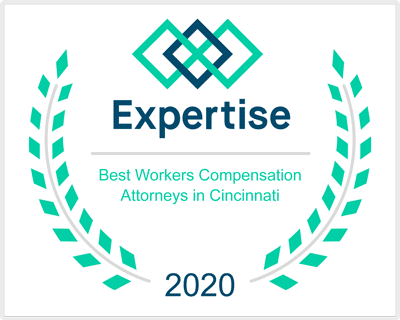
Understanding the terminology used in the Ohio workers’ compensation system is crucial for any employee who has suffered physical harm or an occupational disease contracted while on the job. Filing a workers’ compensation claim can be confusing, especially when navigating the various acronyms and legal terms involved in the process to receive benefits.
Below, Cincinnati workers’ compensation attorney Mark L. Newman provides a clear breakdown of common Ohio workers’ comp acronyms and their definitions to help employees better understand their rights and the steps involved in the claims process.
Ohio Workers’ Compensation Acronyms and Definitions
AWW Meaning
AWW stands for Average Weekly Wage. The average weekly wage serves as the basis for calculating all Ohio workers’ compensation benefits and is determined by averaging your total gross income over the year prior to your work-related injury. After the initial 12 weeks of disability, TTD benefits are paid at 66⅔% of the worker’s average weekly wage.
BWC Meaning
In the context of Ohio workers’ compensation law, BWC stands for the Ohio Bureau of Workers’ Compensation. This Ohio BWC is the state agency responsible for managing workers’ comp claims, providing compensation, and overseeing workplace safety programs for workers who suffer job-related injuries or contract illnesses while on the job.
CS/CSS Meaning
CS stands for Claim Specialist, also called a Claims Service Specialist (CSS), which is the person responsible for managing claims, assisting injured employees and their employers with the claims process, and ensuring that workers’ compensation benefits are properly administered according to BWC regulations.
DHO Meaning
DHO stands for District Hearing Officer. A DHO is an official within the Ohio Industrial Commission who conducts initial hearings on disputed workers’ comp claims. The DHO reviews evidence from both the injured worker and the employer and makes a decision regarding issues such as benefit eligibility or extent of disability.
DOI Meaning
DOI stands for Date of Injury, which is the specific date that a work-related injury or illness occurred.
DWRF Meaning
The Disabled Workers’ Relief Fund (DWRF) in Ohio workers’ compensation law is a supplemental fund designed to provide additional financial assistance to injured workers who are receiving PTD benefits but whose payments fall below a certain threshold due to inflation or cost-of-living increases.
EOD Meaning
EOD stands for Extent of Disability, which refers to the evaluation of how much a work-related injury or illness has impaired an individual’s ability to work. The BWC schedules injured workers for an extent of disability exams to determine whether they have reached maximum medical improvement and are still entitled to temporary total disability compensation.
FROI Meaning
FROI stands for First Report of Injury. The FROI is the initial form submitted to the Ohio BWC to report a work-related injury or illness and provides essential details about the incident, including the nature of the injury, the date it occurred, and the circumstances, thereby initiating the claims process.
FWW Meaning
FWW stands for Full Weekly Wage. In Ohio, full weekly wage is used to calculate the amount of compensation an injured worker receives during the first 12 weeks of being off work due to an injury, based on the worker’s full earnings prior to the injury. The FWW is determined by taking the higher of two calculations:
- Divide the total gross wages (including overtime) earned in the six weeks before the injury by six.
- The gross wages (excluding overtime) earned in the seven days before the injury by seven.
For the first 12 weeks of temporary total disability (TTD) benefits, compensation is set at 72% of the FWW. After this initial period, the compensation may shift to calculations based on the worker’s average weekly wage.
IC Meaning
IC refers to the Ohio Industrial Commission. The IC is responsible for resolving disputes between injured workers and employers regarding workers’ compensation claims, conducting hearings, and making decisions on contested issues such as eligibility for benefits or the extent of disability.
IME Meaning
IME stands for Independent Medical Examination. It is an evaluation conducted by a doctor who is not treating the injured worker, typically requested by the employer, the Ohio Bureau of Workers’ Compensation (BWC), or the Industrial Commission. The purpose of an IME is to provide an unbiased medical opinion on the worker’s condition, extent of disability, and eligibility for benefits.
LM Meaning
LM stands for Living Maintenance, which refers to financial benefits provided to injured workers who are participating in an approved vocational rehabilitation program. Living maintenance is designed to support the worker’s living expenses while they undergo retraining or rehabilitation to return to work.
MCO Meaning
MCO stands for Managed Care Organization. Managed care organizations are responsible for coordinating medical care for injured workers with provider networks, ensuring they receive appropriate treatment based on their medical condition, and facilitating the medical management of workers’ compensation claims in collaboration with the BWC.
MMI Meaning
MMI stands for Maximum Medical Improvement. Maximum medical improvement refers to the point at which an injured worker’s condition has stabilized and no further improvement is expected, even with continued medical treatment. Once MMI is reached, the worker may be evaluated for permanent disability benefits if they continue to experience lasting impairments.
OSHA Meaning
OSHA refers to the Occupational Safety and Health Administration, a federal agency that sets and enforces workplace safety standards. While OSHA is not directly involved in the administration of workers’ compensation claims in Ohio, its regulations and inspections help ensure safe working conditions, which can prevent workplace injuries and claims.
PPD Meaning
PPD stands for Permanent Partial Disability, which is the compensation awarded to an injured worker who has sustained a permanent impairment from a work-related injury but is still able to work in some capacity. PPD benefits are based on the degree of permanent damage and are provided to compensate for the lasting effects of the injury.
PTD Meaning
PTD stands for Permanent Total Disability. PTD benefits are awarded to an injured worker who is permanently unable to return to any form of sustained employment due to a work-related injury or illness, providing ongoing wage replacement for the worker for the rest of their life.
SHO Meaning
SHO stands for Staff Hearing Officer. An SHO is a higher-level official within the Ohio Industrial Commission who reviews and makes decisions on appeals from District Hearing Officer (DHO) rulings. If either party disagrees with the DHO’s decision, the case can be escalated to the SHO for a second-level hearing and determination.
SI Employer Meaning
An SI employer, or Self-Insuring Employer, is a company that has been approved under Ohio law to manage their own workers’ compensation claims rather than relying on the state insurance fund provided by the BWC. As such, a self-insured employer does not pay premiums to the state insurance fund but instead takes on the responsibility to pay compensation and medical benefits directly to injured workers themselves. This type of employer must meet specific financial and regulatory criteria to ensure their workers can obtain benefits as needed.
TPA Meaning
TPA stands for Third-Party Administrator. A TPA is a private organization that assists employers in managing their workers’ compensation claims, handling administrative tasks such as processing claims, managing premium payments, and helping to reduce claim costs through claims management strategies.
TTD Meaning
TTD stands for Temporary Total Disability, which is a type of benefit provided to an injured worker who is temporarily unable to return to work due to a work-related injury or illness. TTD compensation is intended to replace an injured worker’s lost wages until they are fully recovered and able to resume employment.
VSSR Meaning
VSSR stands for Violation of a Specific Safety Requirement. This refers to a situation where an employer fails to comply with specific safety requirements and rules set forth by the Ohio BWC. If a worker is injured due to the employer’s violation of these regulatory requirements, they may be entitled to additional compensation beyond standard workers’ compensation benefits.
WWL/NWWL Meaning
WWL stands for Working Wage Loss, which refers to compensation provided to an injured worker who has returned to work but is earning less than their pre-injury wages due to job-related restrictions. NWWL, on the other hand, stands for Non-Working Wage Loss and applies when an injured worker is unable to find suitable employment due to injury-related restrictions, despite making a good-faith effort to find work.

For More Answers to Your Ohio Workers’ Comp Questions, Reach Out to Mark L. Newman Today
If you are navigating a workers’ compensation claim in Ohio, understanding the legal terminology and how it impacts the medical benefits and compensation paid to you is essential to your recovery. If you have questions or need assistance with your claim, don’t hesitate to reach out. Contact experienced Ohio workers’ compensation lawyer Mark L. Newman for knowledgeable and dedicated guidance, ensuring you receive the benefits and support you deserve as you focus on your recovery.
To get in touch, simply call (513) 496-1417 or send a message online to schedule a consultation regarding your claim.




